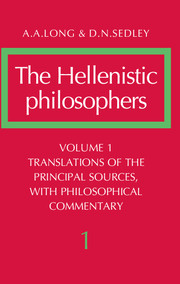Epicureanism
from Translations and commentary
Published online by Cambridge University Press: 05 June 2012
Summary
PHYSICS
The principles of conservation
Epicurus, Letter to Herodotus 38–9
(1) Having grasped these points, we must now observe, concerning the non-evident, first of all that nothing comes into being out of what is not. For in that case everything would come into being out of everything, with no need for seeds. (2) Also, if that which disappears were destroyed into what is not, all things would have perished, for lack of that into which they dissolved. (3) Moreover, the totality of things was always such as it is now, and always will be, (4) since there is nothing into which it changes, (5) and since beside the totality there is nothing which could pass into it and produce the change.
Lucretius 1.15 9–73
(1) For if things came into being out of nothing, every species would be able to be produced out of everything, nothing would need a seed. (2) Men, to start with, would be able to spring up out of the sea and scaly fish from the land, and birds hatch out of the sky. Cattle and other livestock, and every species of wild animal, would be born at random and occupy farmland and wilderness alike. Nor would the same fruits stay regularly on the same trees, but would change over: all trees would be able to bear everything.
- Type
- Chapter
- Information
- The Hellenistic Philosophers , pp. 25 - 157Publisher: Cambridge University PressPrint publication year: 1987
- 1
- Cited by



